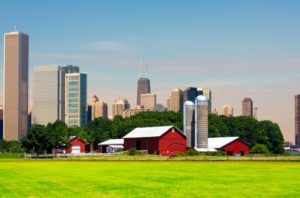Real diversity is experiential capacity. ~Quentin J. Schultze
 The presidential election was personal for me. It put a spotlight on something that is a personal struggle. I feel pulled, stretched, and strained. An NBC News article entitled How the 2016 Election Exposed America’s Racial and Cultural Divides describes what’s pulling me in two very different directions.
The presidential election was personal for me. It put a spotlight on something that is a personal struggle. I feel pulled, stretched, and strained. An NBC News article entitled How the 2016 Election Exposed America’s Racial and Cultural Divides describes what’s pulling me in two very different directions.
The biggest difference between the two parties is the urban-rural divide. That gap widened. Politically, that translates into race and identity as the main political dividing line. Rural and exurban America is very white, and generally inward-looking. Urban America is very diverse and cosmopolitan, said Lee Drutman, a political scientist at New America, a Washington-based non-partisan think tank.
I recognize that I’m not the only person in this position. I grew up in rural America, very rural America, on a small farm in Kansas. For the past 16 years I’ve lived in urban America, very urban America, in Chicago. I’ll admit, I feel most at home (by far) in urban America.
My history, my life experience, represents the polarizing opposites exposed in this election. So I’ve been reflecting, thinking, and wondering–where do I fit? What’s my identity in the midst of this divide? What would be a leadership perspective?
Then Quentin Schultze offered me the opportunity to read a manuscript for a book he’s about to publish, 30 Days to Great Communication for Leaders. I came across this sentence: “Real diversity is experiential capacity.”
…diversity comes from the inside of people, not from the outside. Diversity has more to do with culture than color. Real diversity is experiential capacity. Perhaps we servant leaders have to stretch beyond contemporary notions of diversity that are limited by simplistic categories. (30 Days to Great Communication for Leaders by Quentin Schultze, p. 52)
It was the reminder I needed to hear. That effective leaders are stretched because they are looking for ways to increase their experiential capacity. That real diversity is the result of experiential capacity.
…diversity requires deep communicative capacity. This capacity gains traction within organizations especially when leaders are personally hospitable to a wide range of other persons’ life experience across geographic space and through generational time. (30 Days to Great Communication for Leaders by Quentin Schultze, p. 52)
My identity is not on either side of the divide, it’s on both sides. So instead of trying to find a “middle ground,” I’ve decided to stretch even further. I’ve agreed to volunteer my time in scenarios that will take me even deeper into an urban culture and take me back into a rural culture more frequently.
If there ever was a time for leaders to model the way for real diversity and expand their experiential capacity, I believe that time is now.